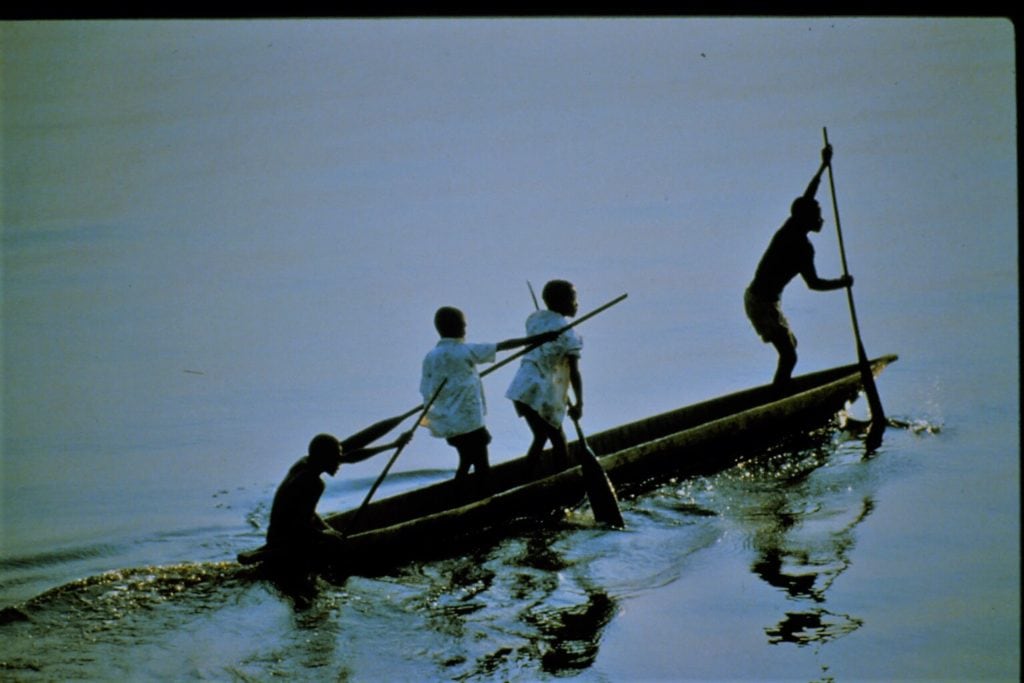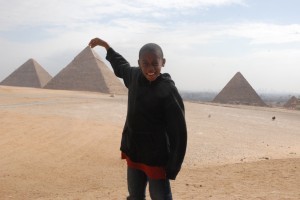
Unlike rowers, boys stand to row their pirogue on the Zaire River.
I sat on the riverbank in Kisangani shelling groundnuts and drinking cool beer in the equatorial heat while waiting to board a freighter down the Congo River through Zaire, now the Democratic Republic of Congo. A gaggle of skinny gap-year “adventurers” spilled from their vehicle and came to chat. “How did you get here?” they asked incredulously, not knowing that anyone would choose to travel on local buses, boats, and trucks instead of the massive tourist vehicles on which they were crossing Africa top to tail in four fast weeks. My companion and I understood their surprised awe. Many people, even fellow travellers we’d met in other parts of Africa, said “Don’t go now – it’s chaos there.”
Every traveller hears “don’t go now” or “let things settle” on a regular basis. But, what does “let things settle” mean? Will things ever settle? We live in a time where economic uncertainty, political stances, natural disasters, or, it must be said, isolated violent acts make some people stay put. They think twice about travelling and put off their travel plans.
Yet, it is this type of inertia that travellers need to be aware of—this feeling of ‘gee, maybe I’ll wait’—and overcome. Many understand and believe deeply that travel rejuvenates and educates you. It can inspire and challenge you. It increases understanding between people from different places and—instead of threatening one’s belief in humanity—it crystallizes it. People who make travel a regular part of their lives need to keep doing just that. They need to exemplify that no matter what is going on in the world now, travel and shared journeys must continue.
But do we really live in times that are any uneasier than 10, or 100 or 1000 years ago? Perhaps because of our brief window of time on the planet, or perhaps because of our always-on news feed, we forget that times change. Or, they never change. Remember how a volcano erupting in Iceland in 1783 led to the French Revolution? Natural disaster begets compromised economies which begets social and political upheaval.
Eric Lindberg, a California-based travel photographer and writer who explores places in search of the unfamiliar, reminds us of that.
“There has been unrest in the world for as long as people have travelled. This is no more or less risky of a time for travelling than any other. The difference now is that when something happens somewhere, news coverage is often immediate. With this continual barrage of news, the world can start making these times sound a little shaky. Yet, so much of the world is as stable, if not more stable, than where you live.”
Or, does our perception of the times make it seem worse than it really is?
Canadian journalist Tim Johnson, who has visited more than 130 countries on the chase for CNN Travel, Reader’s Digest, and others, says it is mostly our perception.
“Yes, you’ve got to keep your head on a swivel at times, but 99 per cent of the time, a negative perception of a place during a “crazy” time outpaces the reality on the ground. Take proper precautions and, definitely, pay attention to warnings from foreign affairs about destinations. But, in most cases, when people ask me about travelling now, I advise them to go!”

What if you are travelling with children?
National Geographic Traveler contributing editor and Globetrotting Mama, Heather Greenwood-Davis promotes taking your kids on the road and believes that travel opens up our understanding of each other.
“When my family and I travelled around the world in 2011, we cancelled our visits twice to Egypt because of political turmoil before feeling the time was right for us. It is part instinct or gut feel and part research and conversations with people on the ground. I’m so glad we went but others may have felt differently at that same time.”
Renowned travel writer and author, Paul Theroux writes in a still valid New York Times article “Why We Travel,” about how time changes the places we visit.
“The fact that a place is out of fashion, forgotten or not yet on the map doesn’t make it less interesting, just more itself, and any visit perhaps more of a challenge. But travel maps have always been provisional and penciled in, continually updated. The map of the possible world being redrawn right now — parts of it in tragic and unsettling ways — might soon mean new opportunities for the traveler who dares to try it. Travel, especially of the old laborious kind, has never seemed to me of greater importance, more essential, more enlightening.”
That is what travel can do when you ditch naiveté, investigate the current ambience of a place, heed local interpretations, and act curiously and respectfully. In Zaire, I learned that while politics, economies and transportation were chaotic, and life could be harsh for many, I met helpful people, caring locals and made friends while slowly floating 1,000 miles down the Congo River through one of the most stunning river basins on the planet. That country, or more accurately, its people, transformed me.
Travel Tips:
Every traveller is different. Here are ways to alleviate anxiety and feel more grounded before or during a trip.
- Research and educate yourself about potential destinations. Read up on the current news and what is happening there economically. For example, learn about the impact of Brexit so you can engage with Europeans while there.
- Peruse warnings—such as with the S. Department of State Bureau of Consular Affairs or similar in your country—but do your own research online and chat with people on the ground or who have been there recently. While there, be open to new experiences but observe your surroundings, and stay aware.
- Share your itinerary and contact information with family and friends. Stay in touch with them at home while travelling.
- Be friendly, yet kind and respectful. Get intel from locals who can give you a sense of the land, advise of potential issues and areas to avoid.
- For ultimate comfort, travel to suit how you travel—group trips, resorts, guided excursions if you don’t revel in DIY exploration—but go outside your comfort zone from time to time and try a new way of travelling or travel in a lesser-known place or one that’s new to you.


[…] in making a decision about a return to travel in 2021. In 2018 Cathy Senecal shared her post on Travelling in Uneasy Times, including some helpful tips on how to prepare in advance and act when on a trip. In 2016 we […]
[…] safety and security when travelling with some frequency. In 2018 Cathy Senecal shared her post on Travelling in Uneasy Times, including some helpful tips on how to prepare in advance and act when on a trip. In 2016 we […]